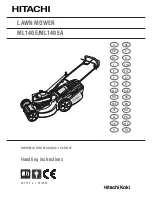
Neutral Adjustment & Tracking Adjustment
If the unit "creeps" while the forward speed control lever is in the
neutral position, then it may be necessary to adjust the
adjustment linkage rods.
The illustration depicts the left side of the machine.
Neutral Adjustment
1.
Park the machine on a flat, level surface such as a concrete
floor, away from bystanders and preferably facing a wall.
Disengage the PTO, engage the parking brake, turn off the
ignition and remove the ignition key.
2.
Chock the front caster wheels. Raise the drive wheels off
the ground and secure the machine with jackstands.
3.
Start the engine and adjust the throttle control to the SLOW
position. See Starting the Engine section for proper starting
instructions.
4.
Disengage the parking brake.
5.
Loosen the jam nut (A, Figure 19) that is tightened against
the ball joint (B).
19
6.
Slowly turn the adjustment linkage rod (C) clockwise until
the drive tire begins to rotate backwards.
7.
Slowly turn the adjustment linkage rod counter-clockwise
until the drive tire begins to rotate forward.
8.
Set the adjustment halfway in between where the forward
and backwards rotations begin.
9.
Re-tighten the adjustment nut.
10. Perform this adjustment for the other side of the machine.
11. Adjust the throttle control to FULL (highest setting). Cycle
the forward speed control lever and the neutral return pedal
several times to insure an accurate adjustment has been
made. If the unit still creeps, perform the adjustment
procedure again. If the unit does not creep, no further neutral
adjustments are necessary.
Tracking Adjustment
Before making a tracking adjustment, be sure to check the
following:
• Drive tires are properly inflated.
• Caster tires are greased and turn freely.
• All controls are free from damage and operate freely.
• Machine is at full operating temperature.
• Make sure the machine is in neutral when the foot pedal is
depressed. If not, adjust neutral as described above.
If machine veers to the LEFT:
1.
Loosen the adjustment nut.
2.
Turn the LEFT adjustment linkage rod 1/8 - 1/4 turn
counter-clockwise.
3.
Turn the RIGHT adjustment linkage rod 1/8 - 1/4 turn
clockwise.
4.
Re-tighten the jam nut.
5.
Drive machine on a flat, level surface to test and repeat steps
1 - 4 as necessary.
If machine veers to the RIGHT:
1.
Loosen the adjustment nut.
2.
Turn the RIGHT adjustment linkage rod 1/8 - 1/4 turn
counter-clockwise.
3.
Turn the LEFT adjustment linkage rod 1/8 - 1/4 turn
clockwise.
4.
Re-tighten the jam nut.
5.
Drive machine on a flat, level surface to test and repeat steps
1 - 4 as necessary.
Handle Placement Adjustment
There should be approximately 1" (2.54 cm) of clearance in
between the handle bars and the reverse speed control lever
when the forward speed control lever is in the neutral position.
To Adjust:
1.
Loosen the jam nuts (A, Figure 20) that are located on top
and bottom of the reversing linkage rods (B).
20
Not
for
Reproduction





































